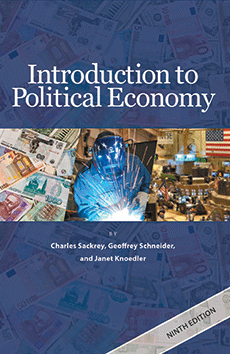Introduction to Political Economy
By Charles Sackrey, Geoffrey Schneider, and Janet Knoedler

- Edition:
- 9th
- Date of publication:
- December 2022
- ISBN:
- 978-1-939402-73-8
- Pages:
- 300
- Price:
- $42.50
Introduction to Political Economy
(9th ed.) presents the work of the most influential economists of modern times—Marx, Veblen, Keynes, Galbraith, and Adam Smith—including their writings on social class, the role of government in taming capitalist economies, and the misleading assumptions about human behavior in mainstream models. It also includes chapters on monopoly capitalism, the Swedish "middle way" between capitalism and socialism, and the Mondragon Corporation (the world's largest cooperative enterprise) in Spain's Basque Country. The book also includes shorter pieces on the economic thought of Hyman Minsky, behavioral economics, fiscal austerity, the global surplus workforce, and more.
The brand-new 9th edition includes a new introductory chapter entitled “Some Principles of Mainstream Economics and Political Economy,” and all chapters have been revised and updated.
Introduction to Political Economy offers a pedagogical gold mine to any teacher seeking to revive the depth and, dare I say it, the excitement of political economy as a way of understanding how the world works. Your students will cheer.—William F. Grover, Chairman, Department of Political Science, Saint Michael's College
I have used Introduction to Political Economy successfully in my classes for several years now. It explains the major political economy approaches in a way that is clear, concise, and engaging. For students who want to understand the world, it is required reading.—Marty Wolfson, Director, Higgins Labor Studies Program, University of Notre Dame
I use Introduction to Political Economy at the beginning of my doctoral seminar on the environment of public administration. Class members enjoy learning about the history of political economy, and the contrast drawn between U.S. and European models produces great discussion of alternatives. Throughout the semester, concepts from the book inform our in-class dialogue, enriching the learning experience. I recommend this book to teachers who want to give students a broad view of political economy and its importance for contemporary public affairs.—Richard Box, School of Public Administration, University of Nebraska at Omaha
